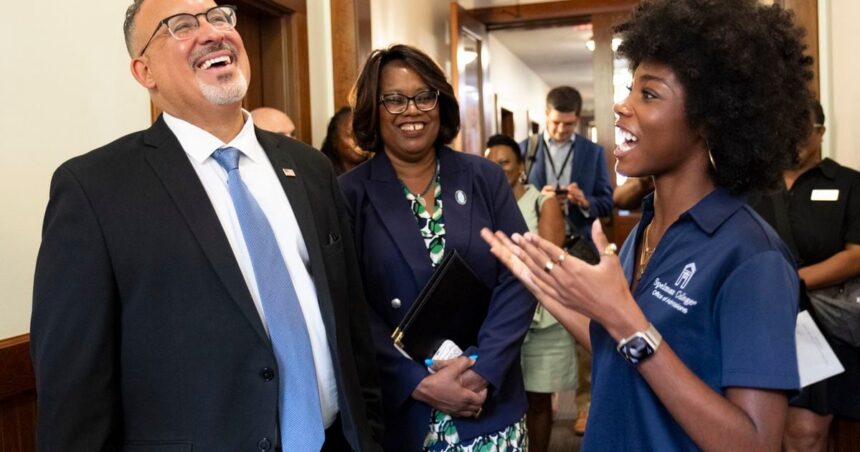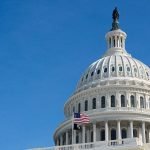“This is the playbook that they had before,” Cardona told reporters. “Destroy public education. Privatize K-12 schools. But education is a public good.”
Credit: Ben Gray
Credit: Ben Gray
Cardona also railed against the looming spectrum of Project 2025, a 900-page governing agenda penned by conservatives that calls for abolishing the Department of Education and, among other things, ending the Public Service Loan Forgiveness program, which provides student loan relief to borrowers who work in federal, state, local or tribal governments, or for a nonprofit organization.
“We need an education system that’s preparing all of our students,” Cardona said. “The president is really big on making sure affordability and accessibility are part of our plan and we’re fighting — despite the Supreme Court trying to stop us, despite our friends on the right side of the aisle and (Capitol) Hill trying to stop us, despite this crazy Project 2025 plan that’s going to destroy public education. We’re going to keep fighting.”
Trump has said he knows nothing about Project 2025. Cardona told reporters that’s a surprise, adding “let’s be real.”
Cardona’s visit coincided with the Department of Education’s announcement Wednesday that they are proposing regulations that would increase college access for high school students, provide better public data on student outcomes — including to increase oversight over distance education programs — and ensure the student aid programs work in the best interests of students.
Cardona met with presidents and leaders from Clark Atlanta University, Spelman College, Morris Brown College, Savannah State University and Morehouse College. The Biden administration, along with Cardona, have repeatedly highlighted efforts to support historically Black colleges and universities. In May, the White House said it has invested $16 billion in HBCUs.
Credit: Ben Gray
Credit: Ben Gray
Cardona said that nearly 5 million Americans are now free of student loan debt after $167 billion worth of federal loans were forgiven through various actions, fixes and federal relief programs. In Georgia, he said, more than 200,000 people got about $8 billion in debt relief.
Some debt relief plans have faced criticism and legal action. The U.S. Supreme Court last year struck down a sweeping student loan forgiveness plan. Georgia is one of seven states that signed on to a federal lawsuit filed in April against a separate effort to reduce student loan debt.
Cardona sat down with five metro Atlanta college graduates who recently benefited from various debt relief programs. With their debt ranging from $10,000 to close to $400,000, each of the five people who met with Cardona told stories about how their lives were put on hold under the heavy weight of debt.
One was Emanuel Lewis, a DeKalb County teacher and athletic director. Earning a bachelor’s degree from Tuskegee University, along with an MBA and a leadership certificate left him $135,000 in debt.
Lewis was paying $700 a month on top of all of his other bills.
“It impacted every decision in my life. From not going on vacations to how I went grocery shopping,” Lewis said. “I went to work every day, having invested in myself to be a better teacher to the students. But when I left work, I was stressed out because I had these bills coming in.”
He got his loan forgiven through the Public Service Loan Forgiveness plan. One of the first things he did — after crying — was buy a house.
“Now, I have a weight off my shoulders,” he said. “A new energy.”
Cardona, a first-generation college graduate, smiled as Lewis told his story.
“You earned this,” Cardona said. “For each of these folks who provided testimony today, it’s a life changer.”












